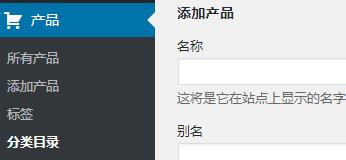register_post_type()函数是用于自定义文章类型的函数
语法结构
register_post_type($post_type,$args)
参数
$post_type (string) (必选) 文章类型的名称(最多20个字符) Default: 空
$args (array) (可选) 一个数组参数 Default: 空
Post Type 可以自定义的功能非常多,所以这个函数里面的 $args参数会很多。所以通常会用下面这种格式来注册,也有很多是可选项:
// 注册自定义文章形式function custom_post_type(){$labels = array('name' => 'Post Type General Name','singular_name' => 'Post Type Singular Name','menu_name' => 'Post Types','name_admin_bar' => 'Post Type','archives' => 'Item Archives','attributes' => 'Item Attributes','parent_item_colon' => 'Parent Item:','all_items' => 'All Items','add_new_item' => 'Add New Item','add_new' => 'Add New','new_item' => 'New Item','edit_item' => 'Edit Item','update_item' => 'Update Item','view_item' => 'View Item','view_items' => 'View Items','search_items' => 'Search Item','not_found' => 'Not found','not_found_in_trash' => 'Not found in Trash','featured_image' => 'Featured Image','set_featured_image' => 'Set featured image','remove_featured_image' => 'Remove featured image','use_featured_image' => 'Use as featured image','insert_into_item' => 'Insert into item','uploaded_to_this_item' => 'Uploaded to this item','items_list' => 'Items list','items_list_navigation' => 'Items list navigation','filter_items_list' => 'Filter items list');$args = array('labels' => $labels,'description' => 'Post Type Description','supports' => array('title','editor','author','thumbnail','excerpt','comments'),'taxonomies' => array( 'category', 'post_tag' ),'hierarchical' => false,'public' => true,'show_ui' => true,'show_in_menu' => true,'menu_position' => 5,'menu_icon' => 'dashicons-cart','show_in_admin_bar' => true,'show_in_nav_menus' => true,'can_export' => true,'has_archive' => true,'exclude_from_search' => false,'publicly_queryable' => true,'capability_type' => 'page',);register_post_type('post_type', $args);}add_action('init', 'custom_post_type');
$labels用来配置文章类型显示在后台的一些描述性文字,默认为空。(上面代码中,为了清晰所以单独拿出来创建了一个数组 $labels)
name – 文章类型的名称(英语写为复数)
singular_name – 单篇文章类型的名称(英语写为复数)
add_new – 对应“添加新的文本”
all_items – 子菜单的字符串。默认是所有帖子/所有页面。
add_new_item – “添加新帖/新页面”
edit_item – “编辑帖子/页面”
new_item – “新贴/新页”
view_item – 用于查看帖子类型归档的标签。默认是’查看帖子’/’查看页面’
search_items – 默认是搜索帖子/搜索页面
not_found – 默认是没有发现帖子/找不到页面。
not_found_in_trash – 默认是在垃圾桶中找不到帖子/在垃圾桶中找不到页面。
parent_item_colon – 此字符串不用于非分层类型。在层次结构中,默认为“父页面:”。
menu_name’ – 菜单名称,默认与`name`相同。
$args的详细参数
description – 一些简短的介绍文字
public- 用于定义publicly_queryable,exclude_from_search,show_ui,show_in_nav_menus可见的方式, 默认是false,’true 的话即为show_ui = true,public_queryable = true,exclude_from_search = false,show_in_nav_menus = true
- publicly_queryable – 可以从前台获取的变量(从url中,比如url重写),默认值:public参数的值
- exclude_from_search – 是否能够被搜索到。默认值:与public参数相反的值
- show_ui – 是否生成一个默认的管理页面,也就是是否在后台有管理页面。默认值:public参数的值
- show_in_nav_menus -是否可以在导航菜单中选择post_type。默认值:public参数的值
- show_in_menu- 是否在后台菜单项中显示,如果为ture,那么show_ui的值也必须设置为true,将会有一个顶级菜单项。 默认值:null
menu_position – 在后台菜单中的位置
- 5 – below Posts
- 10 – below Media
- 15 – below Links
- 20 – below Pages
- 25 – below comments
- 60 – below first separator
- 65 – below Plugins
- 70 – below Users
- 75 – below Tools
- 80 – below Settings
- 100 – below second separator
menu_icon-用于此菜单的图标的URL或iconfont中图标的名称 默认值:null – 默认为帖子图标
capability_type – 查看、编辑、删除的能力类型(capability),默认为post
capabilities – 这个帖子类型的功能的数组 (一般人用不到)。默认值:capability_type用于构造
map_meta_cap – 是否使用内部默认元功能处理,只有设置了capabilities才用的上。默认值:false
hierarchical – 文章是否有层级关系,也就是是否允许有父级文章。
supports – 对文章类型的一些功能支持
- ‘title’ 标题
- ‘editor’ (content) 编辑
- ‘author’ 作者
- ‘thumbnail’ 特色图
- ‘excerpt’ 摘抄
- ‘trackbacks’ 引用通过
- ‘custom-fields’ 自定义字段
- ‘comments’ 评论
- ‘revisions’ 修订版
- ‘page-attributes’ 页面属性,类似page,选择页面模板的那个
register_meta_box_cb – 提供在设置编辑表单的元框时调用的回调函数。回调函数使用一个参数$ post,其中包含当前编辑的帖子的WP_Post对象。在回调中执行remove_meta_box()和add_meta_box()调用。默认值:无
taxonomies – 添加已经注册了的分类法
has_archive- 文章是否有归档,就是一个所有文章归档页面
rewrite – 触发此帖子类型的重写操作。为了防止重写,设置为false。默认值:true,并使用$ post_type作为slug
* $ args数组
- * ‘slug’=> string自定义永久链接结构块。默认为$ post_type值。应该是可翻译的
- * ‘with_front’=> bool应该使用前置基座添加永久链接结构。(例如:如果你的永久链接结构是/ blog /,那么你的链接将是:false – > / news /,true – > / blog / news /)。默认为true
- * ‘feed’=> bool应该为此帖子类型构建一个feed permalink结构。默认为has_archive值。
- * ‘pages’=> bool应该是永久链接结构提供分页。默认为true
query_var – 设置此帖子类型的query_var键。 默认值:true – 设置为$ post_type false则表示禁用
can_export – 可以导出此post_type。默认值:true
实例
<?phpadd_action('init', 'my_custom_product');function my_custom_product(){$labels = array('name' => 'Products Name','singular_name' => 'Product Singular Name','add_new' => '添加产品','add_new_item' => '添加产品','edit_item' => '编辑产品','new_item' => '新产品','all_items' => __('所有产品'),'view_item' => '查看产品','search_items' => '搜索产品','not_found' => '没有找到有关产品','not_found_in_trash' => '回收站里面没有相关产品','parent_item_colon' => '','menu_name' => '产品');$args = array('labels' => $labels,'description'=> '自定义的产品类型','public' => true,'publicly_queryable' => true,'show_ui' => true,'show_in_menu' => true,'query_var' => true,'rewrite' => true,'capability_type' => 'post','has_archive' => true,'hierarchical' => false,'menu_position' => 5,'menu_icon' => 'dashicons-cart','taxonomies'=> array('post_tag'),'supports' => array('title','editor','author','thumbnail','excerpt','comments'));register_post_type('product',$args);$labels = array('name' => '产品分类','singular_name' => '产品分类','search_items' => '搜索产品' ,'all_items' => '所有产品' ,'parent_item' => null,'parent_item_colon' => null,'edit_item' => '编辑产品' ,'update_item' => '更新产品' ,'add_new_item' => '添加产品' ,'new_item_name' => '新产品','separate_items_with_commas' => '按逗号分开' ,'add_or_remove_items' => '添加或删除','choose_from_most_used' => '从经常使用的类型中选择','menu_name' => '分类目录',);register_taxonomy('products',array('product'),array('hierarchical' => true,'labels' => $labels,'show_ui' => true,'query_var' => true,));}?>
这里为了直观方便,我直接使用了中文,更好的应该是使用英文然后通过本地化函数来翻译成中文。通过以上代码我们就可以创建一个名为产品的分类

这种方法前端调用的话只需要创建:archive-product.php 模板即可,这个模板用于分类列表页的模板调用,product是我们的post type的名字。创建 single-product.php 模板即可实现分类的文章的详情页的调用。
‘taxonomies’=> array(‘post_tag’)这段代码意思是给自定义post type添加标签页面,如果需要使用WordPress自带的分类标签方法,可以写为注意,’taxonomies’=> array(‘post_tag’, ‘category’)。
在wordpress中也有一种独立的分类法,与文章类型一样,可以使用register_taxonomy()函数来注册分类方法。
文章標題:WordPress常用函数 register_post_type()
文章連結:https://www.wuyanshuo.cn/72.html
更新時間:2022年3月22日
1、本站所有資源均不添加推廣檔案或浮水印,壓縮包內若有廣告檔案和浮水印請勿輕易相信。
2、本站資源均為兩層壓縮,第一層7z(尾碼若為wys,請自行修改為7z)有解壓密碼; 第二層zip或cbz,無解壓密碼,可直接使用漫畫類軟件程式查看; 詳情可參攷解壓教程。
3、本站大部分內容均收集於網絡! 若內容侵犯到您的權益,請發送郵件至:admin#wysacg.top我們將第一時間處理! 資源所需價格並非資源售賣價格,是收集、整理、編輯詳情以及本站運營的適當補貼,並且本站不提供任何免費技術支援。 所有資源僅限於參攷和學習,版權歸原作者所有!





